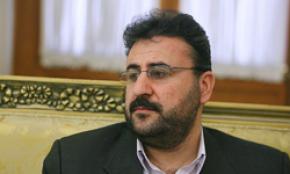ID :
179847
Wed, 05/04/2011 - 10:20
Auther :
Shortlink :
https://www.oananews.org//node/179847
The shortlink copeid
Legislator:Bahrain's Rulers Spreading Iranophobia to Justify Saudi Military Intervention

TEHRAN, May 4 (FNA)- An Iranian top lawmaker categorically denied Manama officials' allegations about Iran's interference in Bahrain's affairs, and said the Al-Khalifa regime is spreading Iranophobia to provide an excuse for the Saudi-led military intervention in Bahrain to have enough military power for suppressing protests.
"Despite the fact that Bahraini officials have deployed the Peninsula Shield Force in the country under the pretext of confrontation against Iran, people of Bahrain know that Iran is not at all interfering in their country's internal developments," Head of the Iranian parliament's Defense Commission Heshmatollah Falahatpisheh told FNA.
The legislator said the Al-Khalifa regime and its allies have failed to work out a proper strategy for confronting their problems in Bahrain, and thus, "they have resorted to Iranophobia plots to stop revolutions in the region".
However, the Iranian lawmaker voiced Iran's support for the people of Bahrain, and noted, "Similar to the other freedom-seeking nations, Iranians support the Bahraini people's demands, and this is a kind of support which has been envisioned and allowed by UN charter."
The remarks by Iranian official came after Bahrain's top military commander revealed Monday that a permanent base for the joint Peninsula Shield Forces would be set up in the country.
Bahrain Defense Force Commander-in-Chief Marshal Shaikh Khalifa bin Ahmed Al Khalifa said in an interview carried by Kuwaiti newspaper Al Rai that such a decision "must be taken by the (Persian) Gulf Cooperation Council (PGCC) leaders."
Deployment of the regional forces in Bahrain is completely illegal because the treaty signed among the six Persian Gulf Cooperation Council member states - Saudi Arabia, UAE, Bahrain, Qatar, Kuwait and Oman - on the deployment of Peninsula Shield Forces to defend the members against threats pertains to those situations when a member state comes under foreign invasion and not when that state is experiencing peaceful uprising of its own people.
Demonstrators in Bahrain have been demanding constitutional reforms as well as an end to the 230-year-old monarchy, with hundreds camping out peacefully in the capital since February 14.
Bahraini security forces have been brutally suppressing anti-government protesters. So far, at least 40 people have been killed, almost 100 have gone missing and about 1,000 others have been injured.
The violence against protesters escalated when Saudi Arabia, Kuwait, the United Arab Emirates, Oman and Qatar dispatched their armed forces to the country to help Manama crack down on peaceful protesters.
"Despite the fact that Bahraini officials have deployed the Peninsula Shield Force in the country under the pretext of confrontation against Iran, people of Bahrain know that Iran is not at all interfering in their country's internal developments," Head of the Iranian parliament's Defense Commission Heshmatollah Falahatpisheh told FNA.
The legislator said the Al-Khalifa regime and its allies have failed to work out a proper strategy for confronting their problems in Bahrain, and thus, "they have resorted to Iranophobia plots to stop revolutions in the region".
However, the Iranian lawmaker voiced Iran's support for the people of Bahrain, and noted, "Similar to the other freedom-seeking nations, Iranians support the Bahraini people's demands, and this is a kind of support which has been envisioned and allowed by UN charter."
The remarks by Iranian official came after Bahrain's top military commander revealed Monday that a permanent base for the joint Peninsula Shield Forces would be set up in the country.
Bahrain Defense Force Commander-in-Chief Marshal Shaikh Khalifa bin Ahmed Al Khalifa said in an interview carried by Kuwaiti newspaper Al Rai that such a decision "must be taken by the (Persian) Gulf Cooperation Council (PGCC) leaders."
Deployment of the regional forces in Bahrain is completely illegal because the treaty signed among the six Persian Gulf Cooperation Council member states - Saudi Arabia, UAE, Bahrain, Qatar, Kuwait and Oman - on the deployment of Peninsula Shield Forces to defend the members against threats pertains to those situations when a member state comes under foreign invasion and not when that state is experiencing peaceful uprising of its own people.
Demonstrators in Bahrain have been demanding constitutional reforms as well as an end to the 230-year-old monarchy, with hundreds camping out peacefully in the capital since February 14.
Bahraini security forces have been brutally suppressing anti-government protesters. So far, at least 40 people have been killed, almost 100 have gone missing and about 1,000 others have been injured.
The violence against protesters escalated when Saudi Arabia, Kuwait, the United Arab Emirates, Oman and Qatar dispatched their armed forces to the country to help Manama crack down on peaceful protesters.





